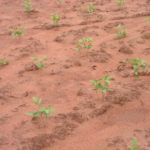


The Foundation for the Promotion and Investigation of Andean Products PROINPA
Alcadia, Sindicato de Taracuchu y Tijraska, Centro de investigacion de Forrajes, Consejo de Desarrollo Municipal de Anzaldo (CODEMA), Centro de Investigacion, Formacion y Extension en Mecanizacion Agricola (CIFEMA)
Bolivia
11/2013—11/2016
1st Phase:
The CCRP Andes commissioned a study in 2012 to assess the state of the art of soil research in the Andes and to identify gaps in knowledge. The proposal seeks to address soil fertility issues through soil microbiology, one of the areas that the report identified as needing more research and development investment. This grant review is for the inception period of a proposal by PROINPA that aims to work in the hillsides of the Anzaldo municipality, North of Cochabamba, Bolivia. Anzaldo farmers grow potatoes, wheat and maize, as well as small quantities of beans, peas, barley, vegetables and fruits. Agriculture in Anzaldo is characterized by low productivity, especially due to an inadequate management of soils, drought and a lack of agro-ecological management strategies. The project seeks to work in the Anzaldo municipality as it is considered the representative of the production conditions and poverty of 35 municipalities in the departments of Cochabamba, Chuquisaca, Potosi and La Paz. The goal is to develop technologies and approaches that ultimately will be useful for all of those municipalities. The project proposes to carry out a broad and ambitious spectrum of research and development activities that involve three crops (potato, wheat and pea), include commercialization of new bio-inputs and crop varieties, and require working with farmers and municipal authorities. Much of the inception period, therefore, will be dedicated to a better understanding of the local conditions and opportunities, in close consultation with farming communities, which will result in identification of a smaller set of high-priority areas for implementation in the full project.
2nd Phase:
This project’s overall purpose is to help producer families in Anzaldo, Cochabamba, Bolivia, improve the resilience of their productive systems and livelihoods through participatory development of technological innovations that contribute to the restoration of soil health in Anzaldo. The CCRP approved the inception phase of this project one year ago, which has allowed PROINPA to adjust and refine the project’s scope, objectives and approaches based on exploratory biophysical and socio-economic research in the area. This project will help to test hypotheses about how change occur in communities and spreads through networks. The results of this research, how farmers use and adapt soil fertility practices, will be informative and applicable to many areas and projects that aim to improve soil fertility through applied science.
